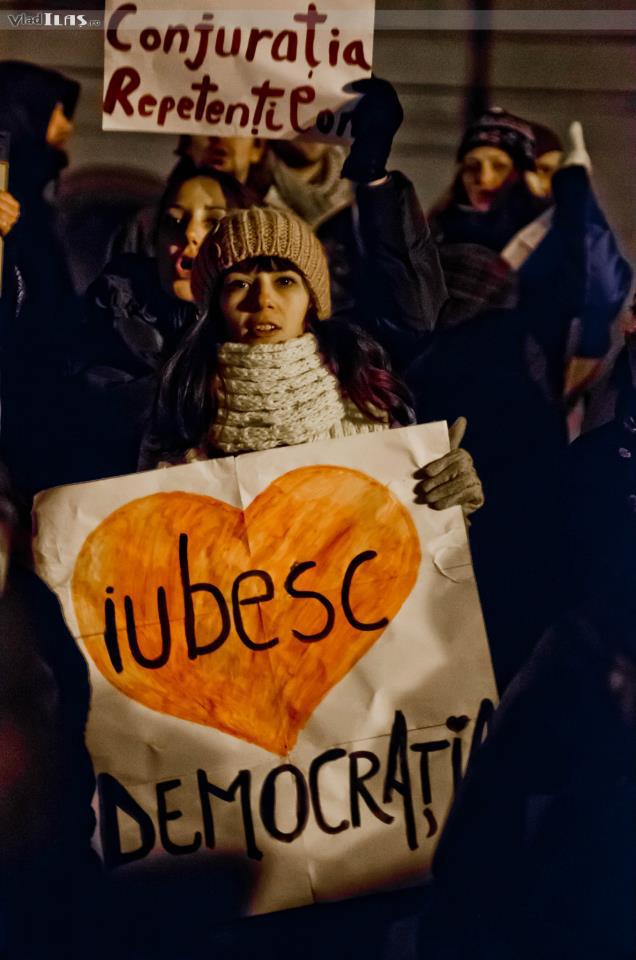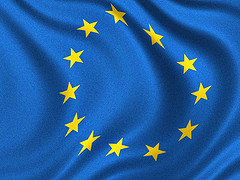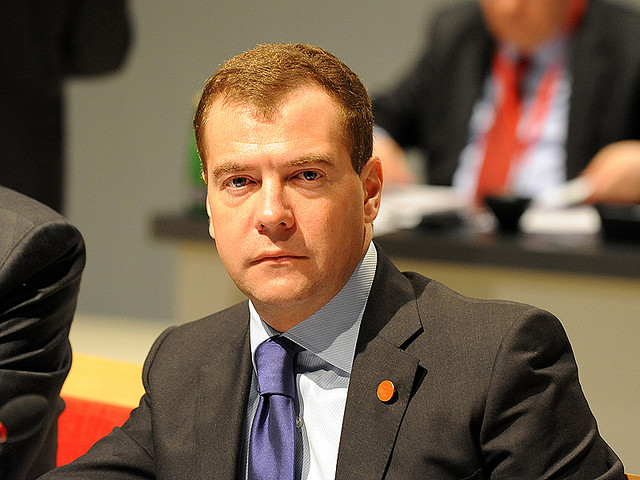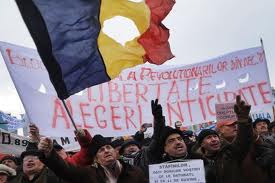
Cyber-statements: Internet protesting and the 2012 Romanian protests
Internet protesting is a concept that has yet to be coined and theoretically conceptualized, even though it exists in practice and has been extensively used during the 2011-2 mass protests that have swept a number of countries in the Arab world in particular and, more recently, Eastern and Southern Europe as well. I will start by, first, providing a starting definition for “internet protesting.” Then, I will apply it to the context of the January-February 2012 Romanian protests. For the purposes of this article, I will argue that “internet protesting” refers to the use of social media, in particular social media websites, such as Facebook and Twitter, to organize and continuously fuel a public manifestation as well as provide a …

Voters’ Block: Will EU governments hold referendums on a new treaty?
As the European Union lurches from crisis to crisis, the chances of getting a new EU treaty are on the rise. Such a new treaty might be the ‘Treaty on Stability, Coordination and Governance in the Economic and Monetary Union’, which is due to be signed in March by all EU members apart from the Czech Republic and the UK. Or, if the worst fears of the Eurozone countries are realised and Greece defaults, a new treaty will be necessary to clean up the ensuing mess. Although most attention tends to focus on the ins-and-outs of treaty negotiations, once a treaty has been signed it still has to be ratified by each country. And the ratification process has rarely gone …

Electoral Reform in Russia: End of the Line for the ‘Locomotives’
Russia’s out-going president, Dmitry Medvedev, has submitted a bill to the State Duma proposing that parties should be banned from fielding ‘fake’ candidates at the top of regional lists for Duma elections. These candidates, usually well-known or popular figures, are referred to in Russian as parovozy(locomotives), and have no intention of taking up seats in the Duma. They appear on the ballot paper solely to attract voters. Following the election, they cede their seats to lesser-known candidates further down the list. Medvedev’s proposals are part of a wider programme of electoral reform, including the re-introduction of gubernatorial elections, which were abolished in 2005. Directly appointed governors had become a liability to the Kremlin in recent years: as an unintended consequence of its …

Honour and Solidarity: The 2012 Romanian Protests
On January 12, over 1,000 Romanian citizens came out on the streets of Bucharest to protest against the resignation of Raed Arafat, the Minister of Health. Mr. Arafat’s resignation was triggered by his discontent over proposed reforms to the emergency medical system under a new health law and also as a result of criticisms from Romanian President Traian Basescu, aired on national television. A Romanian citizen of Palestinian origins, Mr. Arafat is regarded by many as a national hero. In 1991, he created SMURD, a mobile emergency service which has thus far saved thousands of lives and is the most modern and advanced medical facility that the country possesses currently. Due to a lack of government investment and staff departures, the medical …
How much more can the Greek nation take (until it fights back)?
Yesterday Geoffrey Gertz commented in this blog on German Finance Minister Wolfgang Schäuble’s statement on elections in Greece. Indeed solving this crisis will be tough, but perhaps international relations theories can offer some advice on what is needed to address current problems. Part of what is downplayed in recent analysis is the impact of the crisis on national emotions and pride. Realism and Liberal Institutionalism propose that national interest drives states to act the way they do. This type of post hoc rationalising to explain outcomes works successfully enough for academics, policy-makers and journalists; however, what they are missing is how such an interest comes about and what fuels it. Richard Ned Lebow of Dartmouth University published in 2010 ‘Why Nations Fight’. In …
Did the German Finance Minister Seriously Just Suggest Greece Postpone Elections?
I didn’t think it was possible, but the situation between the Greeks and the Germans just grew considerably more ridiculous. German finance minister Wolfgang Schäuble said in a radio interview that the Greeks should postpone national elections planned for April and instead adopt a technocratic government that leaves out the country’s major political parties (h/t Tyler Cowen, who correctly files this under ‘Department of Yikes’, and it’s worth noting that the Finns and the Netherlands are also apparently on board with the German plan). Wow. Due to the Eurozone crisis a lot of things which would have seemed unthinkable a few years ago are now plausible, but even by our new 2012 standards this is just insane. Suffice it to …
Thinking in old terms: can a structural adjustment programme work in Greece?
Taking a step back from the immediate uncertainty over Greece (see here for the latest updates), I’m struck by how similar the situation is to those created by the old 1980s/1990s IMF and World Bank Structural Adjustment Programmes (SAPs). Reading accounts of the negotiations (especially a story in today’s New York Times about how the Germans, IMF, and ECB don’t trust the Greeks), you could rather easily replace “Greece” with “Nigeria” or “Senegal” and be transported 20 years back in time. We can go down the similarity-list. An urgent need for new official lending to roll over past debts? Tick. Tough loan conditionality attached? Tick. Domestic pushback and questionable democratic legitimacy? Tick. Of course, it’s all playing out more publicly/more quickly …
Is Labour becoming the party of ‘One Nation’ politics?
As the old adage went, the Tories used to be the party of the nation and Labour the party of class. Indeed, the term ‘One Nation’ is an old Tory favourite. Benjamin Disraeli’s description of Victorian Britain in Sybil, his 1845 novel, describes a society divided between the extreme rich and equally extreme poor. It was a compelling literary attempt to address the more undesirable impacts of industrialism, namely the problems of urban poverty and widening social inequalities. But things change. Nowadays, to many, the Tories steadfast adherence to the Thatcherite Treasury views of the 1980s makes the older ‘One Nation’ sentiment more anachronistic. Indeed, bankers seem oblivious to the big society. It seems Labour would be wise to pinch …









